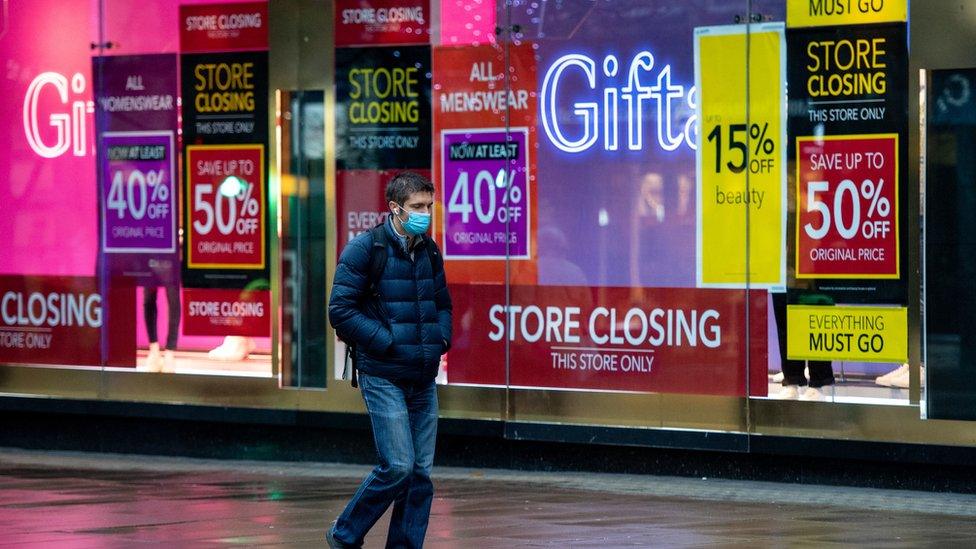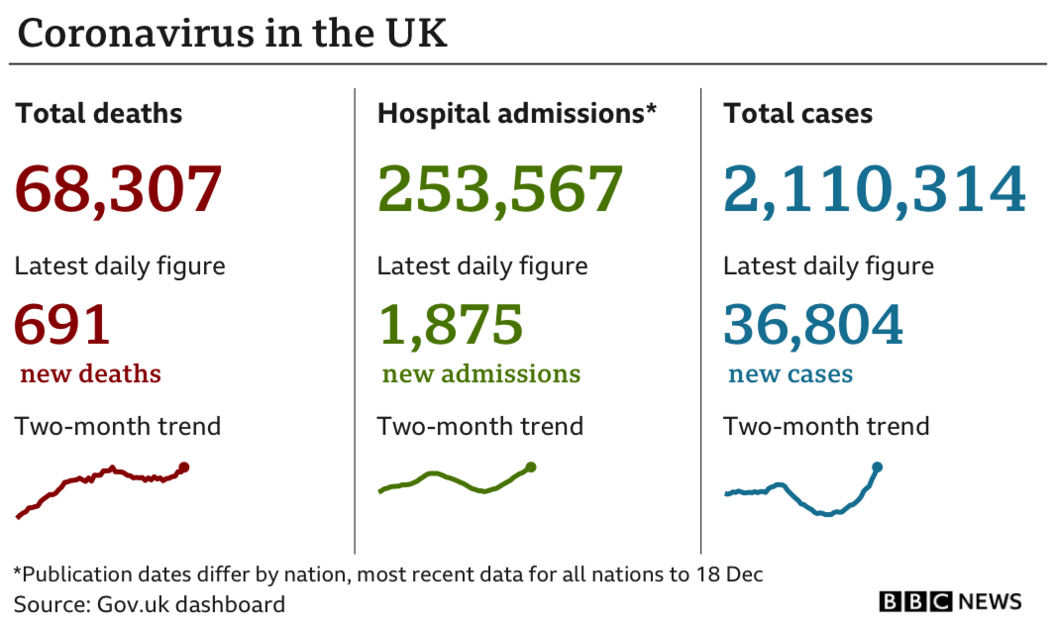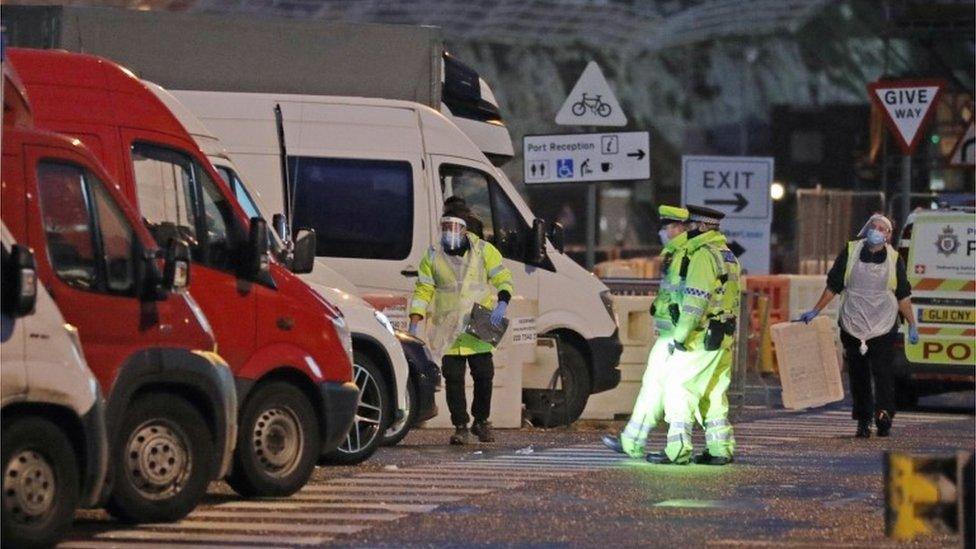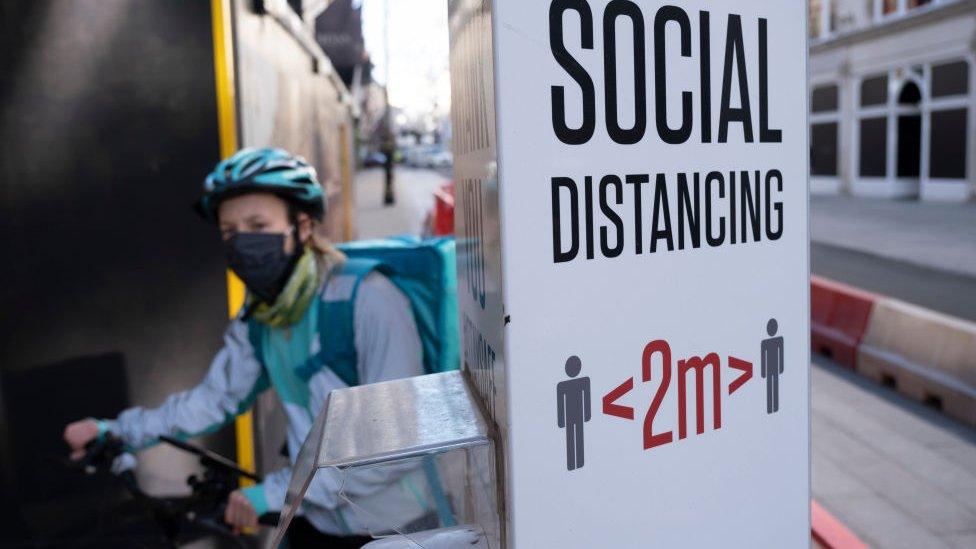Covid-19: More areas of England could be moved to tier 4 restrictions
- Published
- comments

Ministers are deciding whether more areas of England should be placed under the toughest coronavirus restrictions in a bid to contain the spread of a new variant of Covid-19.
Cabinet minister Robert Jenrick said No 10 would make a judgement on whether the current rules were strong enough.
He said there was no immediate plan to widen curbs on Boxing Day but "the number of cases is rising".
Health Secretary Matt Hancock will lead a Downing Street briefing at 15:00 GMT.
He will be joined by England's deputy chief medical officer Dr Jenny Harries and Dr Susan Hopkins of Public Health England.
The Covid operations committee, chaired by Prime Minister Boris Johnson, has been discussing the tiered system - earlier than the 30 December official review date - amid concern over the rapid spread of the new variant.
The latest change to restrictions placed London and large parts of south-east England under new tier four rules, as millions saw their festive plans scrapped or severely restricted.
It comes as the UK's chief scientific adviser Sir Patrick Vallance previously warned that extra curbs were likely to be needed in more areas of England to control the new variant.
He told a Downing Street briefing on Monday that measures could "need to be increased in some places, in due course, not reduced".
Mr Jenrick said earlier that ministers were "trying to retain the robust tiered system" which takes a "proportionate approach" across the country, but said it had been designed before the new Covid variant became apparent.
He said the variant - which could be up to 70% more transmissible than previous strains - was now present in other areas of the country, albeit to a "lesser extent" than in London, south-east and the east of England.
He said: "The tiered system was designed before we knew the full ferocity of the new variant, and so we have to make sure it's sufficiently robust to be able to withstand this and to stop cases rising at the very worrying levels they are now in parts of the country."
Prof Neil Ferguson, whose scientific modelling led to the March lockdown, said the variant is "everywhere now" but said he anticipated that tier four restrictions and stricter rules over Christmas elsewhere could have a beneficial impact.
He told the Commons Science and Technology Committee: "Schools are now shut, we are in a near-lockdown situation across the country. Contact rates are lower over Christmas.
"I expect, though I hesitate to make any sort of predictions, we will see a flattening of the curve in the next two weeks. We will see at least a slowing of growth.
"The critical question is what happens in January and the extent we want to make public health measures more uniform across the country if the new variant is everywhere."
The UK's R value - the number of people that one infected person will pass on a virus to, on average - is thought to have risen slightly to between 1.1 and 1.3 - up from 1.1 and 1.2 the week prior, according to the latest data published by the Government Office for Science and the Scientific Advisory Group for Emergencies (Sage).
On Tuesday, a further 36,804 people in the UK tested positive for the virus and there were 691 deaths within 28 days of a positive test, according to government figures., external
It is the largest daily number of cases recorded yet, though it is thought the infection rate was higher during the first peak in spring when testing was much more limited.
The UK's devolved administrations have also tightened restrictions to combat a rise in cases, with Wales going into another lockdown earlier than planned over the weekend. Mainland Scotland and Northern Ireland start new lockdowns on Boxing Day.

SOCIAL DISTANCING: Can I give my friends a hug?
FACE MASKS: When do I need to wear one?
TESTING: How do I get a virus test?

Mr Jenrick said decisions from the committee would be communicated "as soon as we can" and that there was "absolutely no plan" at the moment to change restrictions before Christmas Day.
Under the revised Christmas rules for England, only people living in tiers one to three are permitted to socialise in a bubble of three households on 25 December.
Those in tier four areas must only celebrate Christmas with members of their own household and support bubble. They will not be allowed to travel to other tiers to see family and friends.
Mr Jenrick said the PM had been "very clear" that even outside of tier four, there was a "strong degree of personal judgment to be exercised here".
He told BBC Radio 4's Today programme: "It's still up to people to come to a conclusion as to how many members of their family or other households they want to bring together on Christmas Day.
"The strong advice is to keep it small, to keep it short and therefore to be safe."

Labour leader Sir Keir Starmer has written to Mr Johnson to say his party will back any government moves to tighten restrictions if that is what scientists recommend.
On Wednesday, Shadow Health Secretary Jonathan Ashworth urged the prime minister to act before it's too late.
He told BBC Breakfast: "What we're saying to Boris Johnson is, last time you received advice from the scientists for tougher restrictions, you sat on it, you dithered, you delayed."
He urged the PM not to "sit on the advice this time", adding "we know delaying has devastating consequences.
"If you're advised to take tougher action, take it, do it, act with speed, don't be behind the curve again."
The Labour leader of Crawley Borough Council, which is currently in tier two but bordering tier four areas, has said the area would be hit hard by a potential tightening of restrictions, and accused the government of failing to provide support.
Cllr Peter Lamb told BBC News that Crawley "might" be placed in a higher tier, adding that case numbers there "would suggest that if it's not going in now, it will be going in at some point in the near future".
He said there had been "no coming back" for Crawley - which includes Gatwick airport - since the March lockdown, and it was "still waiting" for the government to "give us some support to get through this", adding that more businesses would be impacted if the area was placed under the toughest measures.

A PROMISED LAND: Barack Obama reads from his new and compelling presidential memoir
GROUNDED WITH LOUIS THEROUX: Rylan Clark-Neal reveals how one of Louis’s documentaries ignited his teenage sexuality

In other key developments:
Mr Jenrick also said it could take "a few days" to clear a backlog of lorry drivers who need a negative Covid test result to travel from Kent to France. Rail, air and sea services between the UK and France resumed this morning after France eased its travel ban, with the pound pushing higher on Wednesday morning
Scotland's First Minister has apologised for breaching Covid-19 rules by taking her face mask off at a wake. The Scottish Sun had published a photograph, external of Nicola Sturgeon standing talking to three people at a social distance, but with her face uncovered
Related topics
- Published23 December 2020

- Published21 December 2020

- Published23 December 2020